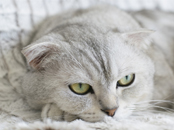23 October 2018
Pets bred for extreme features, such as Scottish Fold cats, often face serious health and welfare issues as a consequence
The British Veterinary
Association (BVA) is urging animal lovers to pick health over looks and avoid
the internet-fuelled craze for designer pets with ‘cute', unusual or extreme
features, such as English Lop rabbits, Scottish Fold cats, bubble-eye goldfish
and miniature horses.
Vets are concerned that many
pet owners may not be aware of health and welfare issues that animals bred with
extreme features suffer from. These problems may not be immediately obvious,
but often cause life-long misery for our pets – for instance, dogs that are
unable to breathe normally, rabbits unable to eat, cats with severe arthritis,
and fish that cannot see or swim properly.
In a recent BVA Voice of the Veterinary
Profession survey, breeding and hereditary defects emerged as vets' top animal
health and welfare concern, with the number of vets mentioning it as a pressing
issue more than doubling over the previous two years. Among companion animal
vets, nearly half (45%) of those surveyed picked conformational deformities and
pedigree breeding, particularly of flat-faced breeds, among the three welfare
issues that concern them most.
Earlier this year, BVA launched the
#BreedtoBreathe campaign to raise awareness about the issues associated with
extreme breeding in brachycephalic, or flat-faced, dogs such as Pugs, French
bulldogs and English bulldogs, whose shortened skull shape leads to trouble
breathing normally, overheating, eye disease and inability to mate or give
birth naturally. In the survey, vets said they found only 10% of dog owners
could recognise their brachycephalic dog's breed-related health issues, while
75% were unaware these potential problems even existed before deciding on the
breed. Almost half of vets believe their clients who choose flat-faced dogs are
swayed by social media or their celebrity idols.
As part of its newly-adopted
policy position on extreme conformation, BVA is urging animal lovers,
breeders, breed clubs, academics, vets and vet nurses to continue to work collaboratively to
tackle the health and welfare impact of extreme breeding across all species.
To guide prospective and current pet
owners on things to keep in mind when choosing a pet, BVA has issued some top
tips on responsible pet purchase:
- Avoid buying a pet bred with
extreme designer features and choose a healthier breed or non-pedigree
animal instead - Always talk to your local vet
for advice on the health and welfare issues associated with a particular
breed before getting a pet - Avoid breeding from animals
with known conformation-related health problems and get them health
tested, where such tests are available (eg the BVA/Kennel Club Canine
Health Schemes) before breeding - When buying a puppy, always use
the free Puppy Contract (https://puppycontract.org.uk)
to ensure you get a happy, healthy pet from a responsible breeder - If you already own a pet with
extreme features, take it to your local vet for regular health checks - Obesity is a cause of concern
for many animals with extreme features, so carefully manage your pet's
diet and exercise regime
British Veterinary Association
President Simon Doherty said:
“We know that flat-faced dogs have exploded in popularity in the UK in
recent years, fuelled by their being a must-have for many celebrities and on
social media. While the UK population of some pets with extreme features is
small at present, we are worried that the internet popularity of breeds like
miniature horses, the English Lop rabbit, the very flat-faced Persian cats, or
ornamental fish bred for bubble eyes or shortened bodies may prompt increased
demand among consumers who are unaware of the potential serious health and
welfare issues associated with such breeding.
“These hereditary problems are
distressing for the animals and can be costly for the owners to treat. If
you're looking for a pet, our advice is to pick health over looks and choose a
healthier breed instead.
“We would encourage anyone thinking of getting a pet to arrange to
speak with their local vet to receive advice on the health and welfare problems
associated with certain breed types.”



